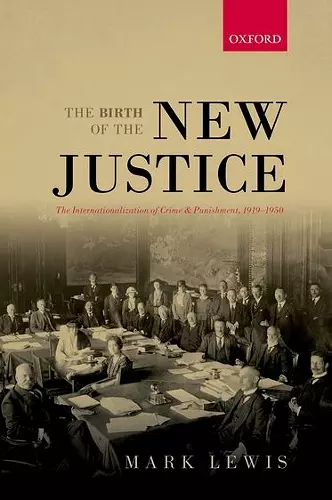The Birth of the New Justice
The Internationalization of Crime and Punishment, 1919-1950
Format:Paperback
Publisher:Oxford University Press
Published:11th Aug '16
Currently unavailable, and unfortunately no date known when it will be back
This paperback is available in another edition too:
- Hardback£142.50(9780199660285)

Until 1919, European wars were settled without post-war trials, and individuals were not punishable under international law. After World War One, European jurists at the Paris Peace Conference developed new concepts of international justice to deal with violations of the laws of war. Though these were not implemented for political reasons, later jurists applied these ideas to other problems, writing new laws and proposing various types of courts to maintain the post-World War One political order. They also aimed to enhance internal state security, address states' failures to respect minority rights, or rectify irregularities in war crimes trials after World War Two. The Birth of the New Justice shows that legal organizations were not merely interested in ensuring that the guilty were punished or that international peace was assured. They hoped to instill particular moral values, represent the interests of certain social groups, and even pursue national agendas. When jurists had to scale back their projects, it was not only because state governments opposed them. It was also because they lacked political connections and did not build public support for their ideas. In some cases, they decided that compromises were better than nothing. Rather than arguing that new legal projects were spearheaded by state governments motivated by "liberal legalism," Mark Lewis shows that legal organizations had a broad range of ideological motives - liberal, conservative, utopian, humanitarian, nationalist, and particularist. The International Law Association, the International Association of Penal Law, the World Jewish Congress, and the International Committee of the Red Cross transformed the concept of international violation to deal with new political and moral problems. They repeatedly altered the purpose of an international criminal court, sometimes dropping it altogether when national courts seemed more pragmatic.
These chapters are small monographs, most of which are extremely well researched on the basis of archival sources and bring many new insights. Yet their sum does not create a history of international criminal law, but a detailed critical commentary on many of these histories of international criminal law. It is the great merit of this book that it carefully traces the discontinuities, the fissures and inner contradictions, and not least of all the political contingencies, which characterize the development of international criminal law. And nevertheless, as Lewis makes clear, the particular fragments remain in memory, surfacing again as reference points and not disappearing from history. In this sense, it is an immensely stimulating work worth reading. * Rainer Huhle, Nürnberger Menschenrechtszentrum *
Besides stimulating new insights for those already familiar with this fascinating subject, The New Justice can be highly recommended to those seeking an entry point into the field. * William A. Schabas *
- Winner of Winner of the 2015 Bronisław Geremek Prize; Winner of the Fraenkel Prize in Contemporary History 2013..
ISBN: 9780198783251
Dimensions: 233mm x 156mm x 20mm
Weight: 544g
360 pages